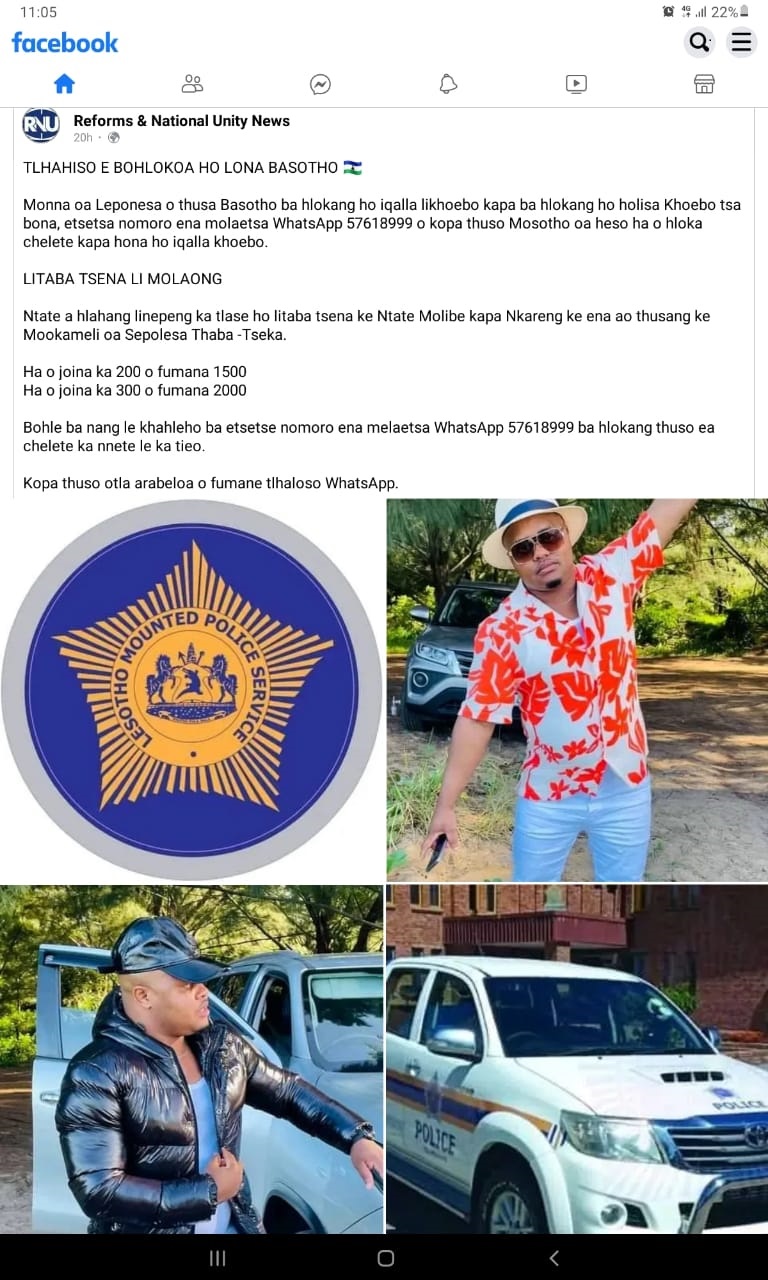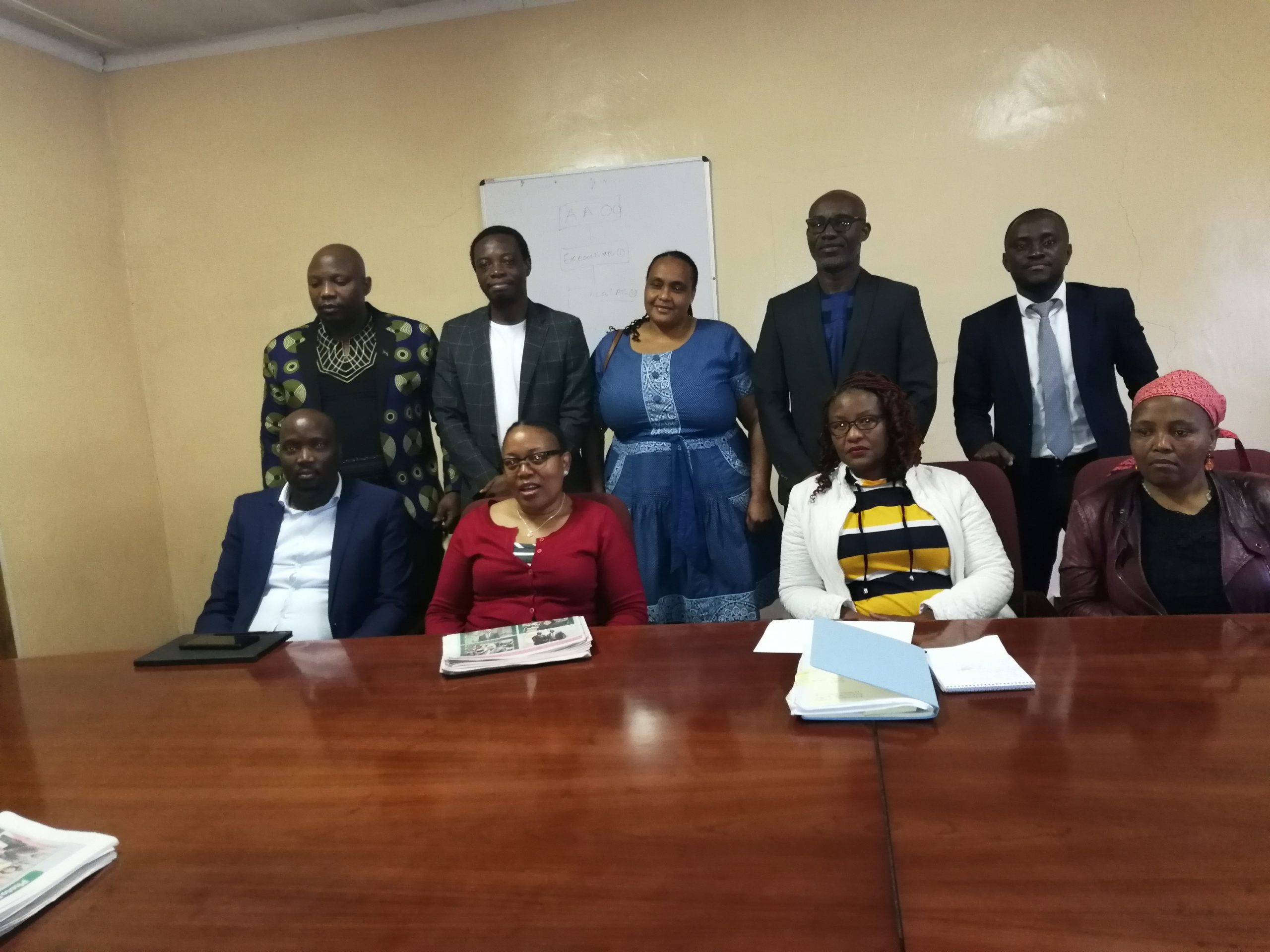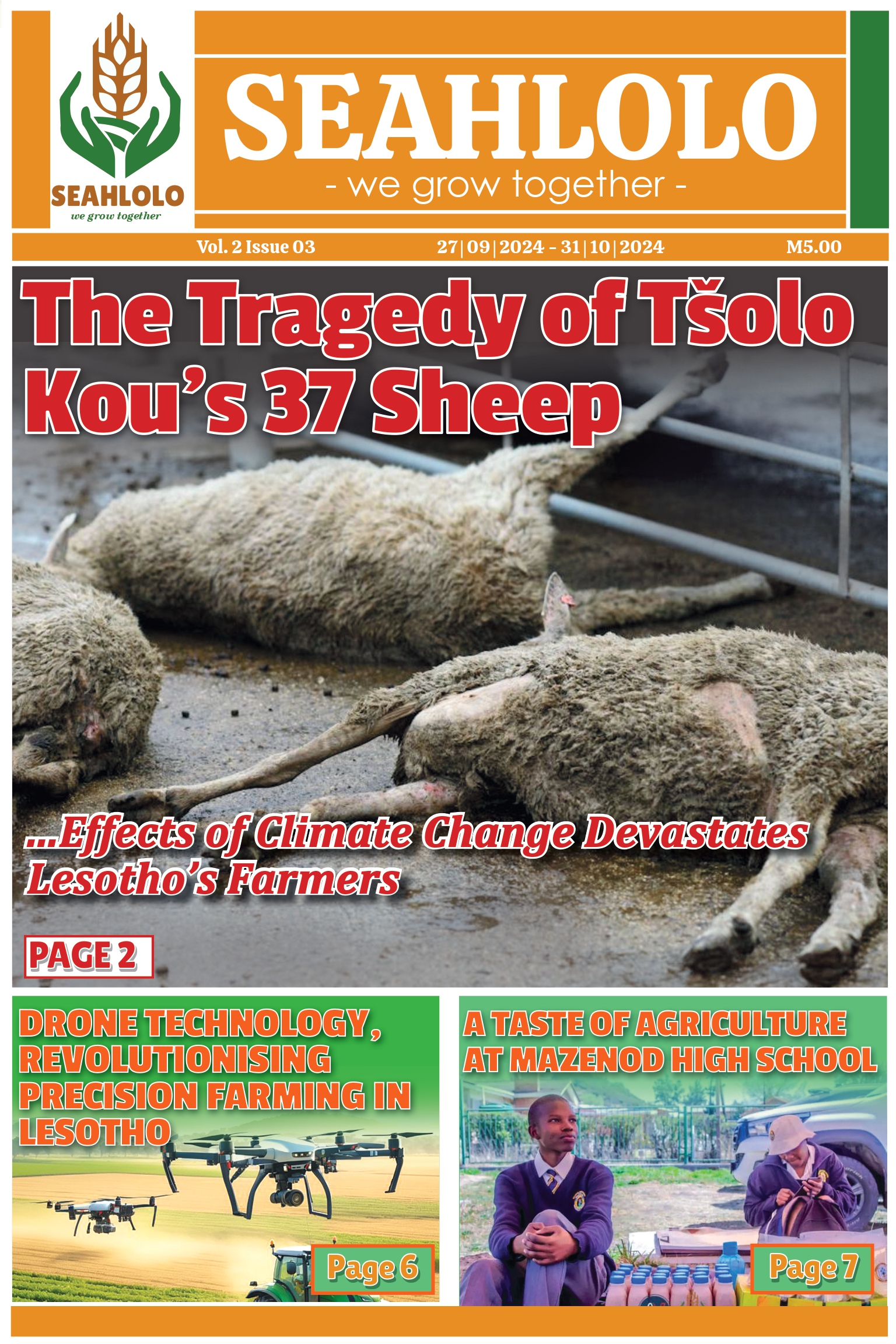Lerato Matheka
Peddlers of misinformation target the Lesotho Mounted Police Service (LMPS), and it is not the first time.
The Police information office has on many incidents issued correct statements rectifying intentional misinformation communicated on different social media platforms.
The current episode the LMPS is battling according to deputy police spokesperson, Inspector Mareabetsoe Mofoka is a ‘scam’ post involving the manager of the Thaba-Tseba Police Post.
“We battle with lies all the time and those involving the police are worse.
“We are currently trying to get the owner of a post about the manager of the Thaba-Tseka Police post who is said to be helping people with starting businesses and getting jobs at a cost. The owner of the post has used the logo the LMPS logo and branded police cars on the post as well as a picture of a man we don’t know, and the post is asking Basotho to pay between M200 and M500.â€
“The man in the picture we don’t know, and when we tried to investigate who was behind the post, we learned that the account was fake. It cloned an already existing account which has coined itself a media platform and is operating on Facebook,†Mofoka explained.
She noted that the issue of social media being used to spread lies about people and causing confusion is a real threat to information and there is not much that the police can do currently, “…at least not adequately anyway,†the Inspector said.
Because the country does not have a cyber-governing law, Mofoka said people have seen a loophole and there is a widespread of fake accounts used for different intentions.
“Other fake accounts were created to scam people, others are used to insult and humiliate other users while others peddle lies.â€
“We further have a challenge of careless use of traceable accounts whose users are not hiding. The very users victimise people, spread lies and insult people and organisations, and all because there is no law to use as a tool of control.â€
She said the LMPS has been a victim of malicious information shared on social media around our work.
“We have had incidents where plain pure lies were shared and caused confusion, and my office is quick to react to such acts.â€
The most recent incident includes a Facebook page made by the leader of the Basotho National Party when trying to clarify a controversial confiscation of his bodyguard. The LMPS issued a statement clarifying what they said were lies.
“We make sure we use all credible mediums to inform the nation of the truth behind what would be said about us,†Mofoka said noting they feel it is important to react because “silence in most cases means consent thus our responsive strategy works in our favour.â€
“We believe it is our responsibility to give people the correct information when false one is making rounds.â€
Mofoka said Facebook is the biggest used social media platform in Lesotho, thus posing a significant threat to the correct dissemination of information.
The current issue is posted on a clone of Reforms she said indicating the owners of the “official†Reforms page have too issued a statement distancing themselves.
“Thaba-Tseka is managed by Superintendent Karabo Morapeli and he looks nothing like that, but we have a Cyber-Unit that is on it.â€
Mofoka stressed that in the absence of an internet use control law, the Police are currently using the Penal Code to track and bring justice to people who abuse misinformation.
“Our Cyber-Unit has handled several cases of mis/disinformation emanating from Facebook using the Penal Code and until the Cyber Law is passed, we will have to do what we can.
“Penal Code is a set of different laws, both criminal and civil and we have helped many people identify how to get justice from people who use social media to peddle lies about them.â€
She noted there was hope for a more improved and responsible use of social media, and LMPS’s Cyber-Unit is going hard on ensuring people are reprimanded.
Communication Specialist and former Lesotho Communications Authority Communications Manager, TÅ¡iu TÅ¡iu noted that with the wide coverage of mobile phones in Lesotho and access to the internet, many people could be subjected to misinformation and disinformation.
“You will realise that the spread and use of misinformation and disinformation take many forms. There are some actors or instigators who use misinformation to directly benefit from their acts of deceiving people. They are kingpins and may represent different sectors, and mostly their benefits also different be it political, financial or otherwise.
“Then there are agents used to create the misinformation to propagate the dis/misinformation. The agents create messages that can take different forms, from cloned research papers to doctored and manipulated pictures or videos which would be believable to unsuspecting consumers,†he explained confirming that Facebook, in Lesotho, is mostly used to propagate disinformation.
“It is mostly seen with political parties affiliated pages whose activities discredit their opposition or simply spread untrue information and during election time, their disinformation sways people’s decision to voting, and there are individuals who then take the Facebook misinformation and spread it on WhatsApp.â€
“In this chain of disinformation and Misinformation, there are state actors and non-state actors who are involved in the peddling of fake news. Then there are intermediaries in the form of websites which use algorithms to collect data, and this one mostly works where there is financial scamming,†Tšiu said stressing that everyone including institutions is at risk of being conned or consuming misinformation and disinformation and journalists are mostly targeted because of their role of working with information.
Tsiu advised that to safeguard government institutions from disinformation and misinformation, the said departments need to share and give access to its information so that people will know and be able to make informed decisions.
He further stressed that Lesotho Journalists need to invest their time to fact check information they receive.
“We are lacking in information dissemination as a country because we don’t have a legal instrument that speaks on that. The availability of a law that governs access to information makes it for both journalists and the general public to look for facts to have what is correct,†he said.
Mzimukhulu Sithetho, Consultant – Programme and Resource Mobilization Advisory- Media Institute of Southern Africa and communications specialist indicated the ‘careless’ use of social media as a channel for disinformation was worrisome towards access to information, and continues to undermine the trust that centred around those who shared information.
He pointed out a need to gate-keep information before posting on social media but was quick to note that the issue is global and may take Lesotho a long time to win the war.
He stressed peddling misinformation is a threat not only to information but, to “Political, security and economical.â€
“The spread of misinformation and disinformation is a social which needs to be addressed collaboratively. Lesotho needs to take time and look at regulatory mechanisms to control the use of social media to curb the widespread of fake news,†he said charging that with the digital advancement, citizens have become collectors and disseminators of information and sharing outside the traditional limitations used on journalism.








